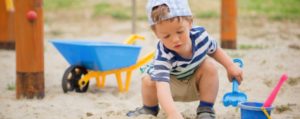 HYANNIS – If there is one thing the internet has become really adept at, it’s scaring parents. Now that summer is here, parents who scroll through social media sites can find all kinds of stories about bacteria and parasites in ponds and sandboxes, and urine and fecal material in pools.
HYANNIS – If there is one thing the internet has become really adept at, it’s scaring parents. Now that summer is here, parents who scroll through social media sites can find all kinds of stories about bacteria and parasites in ponds and sandboxes, and urine and fecal material in pools.
These stories don’t alarm pediatrician Sharon Daley, MD at Seaside Pediatrics in West Yarmouth. In fact, she’s more worried that stories like these might cause parents to keep their children indoors at a time when most children are not getting enough exercise.
“I think the benefits of fresh air and active play outweigh the risks of being exposed to germs, if you use common sense,” she said. “I don’t want to tell anybody anything that would prevent them from going out and enjoying outdoor exercise and activities.”
Her common-sense approach to keeping children safe:
- Wash their hands with soap and water after any outdoor play and always before meals.
- If you are outdoors and don’t have access to soap and water, hand sanitizers can be used as a backup.
- You don’t need to use antibacterial soap when you have access to a sink. The vigorous action of regular soap and the friction of rubbing your hands together is plenty.
Most of the bacteria and parasites a child might encounter cause stomach upsets, but Dr. Daley, who is chief of pediatrics at Cape Cod Hospital, has not seen any evidence that this is large problem. She sees children with stomach aches, vomiting and diarrhea year-round, but, in general, she sees more illnesses in the winter than the summer.
While some digestive tract illnesses may be caused by exposure to things outdoors, there is no way to tell for sure. Viruses with fevers and rashes are actually more common than stomach ailments in the summer.
“We do see more of the external ear infections, which is called ‘swimmer’s ear,’ with pond swimming than with ocean swimming,” she said. “I tell people after swimming in ponds to dry the ears carefully, either with a towel or a hair dryer because the germs that cause swimmer’s ear love places that are warm, dark and moist. An ear canal that is moist after swimming is a great breeding ground for bacteria.”
Pool Issues
Pools have other issues. A large Canadian study released this spring found the presence of urine in all of the 250 samples from 31 pools and hot tubs in two Canadian cities. Scientists tested the water for an artificial sweetener that could only occur from people urinating it. They estimate that a commercial size 220,000-gallon pool has about 20 gallons of urine in it. A typical size residential pool has about 2 gallons.
As part of the study, they noted that when urine mixes with chlorine it produces that strong chemical odor that most people associate with just chlorine. The more urine, the stronger the smell of chlorine. A healthy pool has relatively little scent.
Dr. Daley said that urine by itself isn’t dangerous, but there is a gross-out factor.
“Urine is usually sterile and germ-free,” she said. “No one likes the thought of swimming in water that people have urinated in, and it could be accompanied by trace amounts of fecal material which does have bacteria. However, I wouldn’t recommend judging a pool by the smell of chlorine, since there is variation in the sensitivity of peoples’ noses.”
To keep public pools cleaner, the easiest thing to do is to educate people that it is not socially acceptable to urinate in a pool. Dr. Daley also recommends that people shower before they get into a pool to remove body lotions, hair products, skin oils, and traces of fecal material to keep the pool safer for all.
Public kiddie pools can be problematic because swim diapers do not prevent urine or feces from getting into the water. At home, Dr. Daley recommends emptying the kiddie pool after each use. Not only does that insure the water will be fresh and clean each time, but it also prevents accidental drownings.
Sand Box Play
Playing in sand helps kids develop motor and social skills, so Dr. Daley offers the following tips for home sandboxes from the American Academy of Pediatrics:
- Keep the sandbox covered when it is not in use to keep out insects and other animals.
- Let the sand dry completely before covering the sandbox because bacteria can grow in wet sand.
- Rake the sand regularly to remove any debris.
- Don’t allow pets in the sandbox because they may mistake it for a litter box.
“Our summers are short and kids need to be outside,” Dr. Daley said. “They need fresh air and exercise. Just be sure to use appropriate sunscreen so they don’t get burned and remember that sunscreen needs to be reapplied every two hours when kids are swimming or sweating.”
























